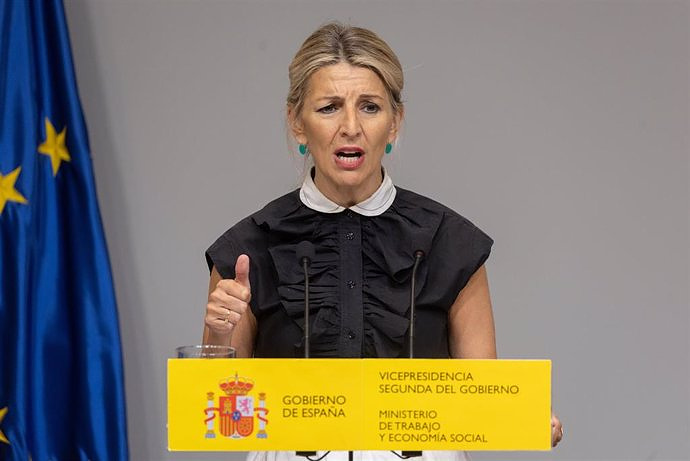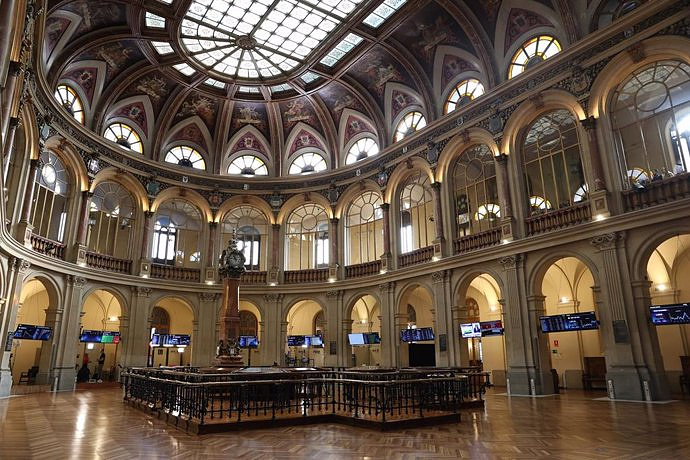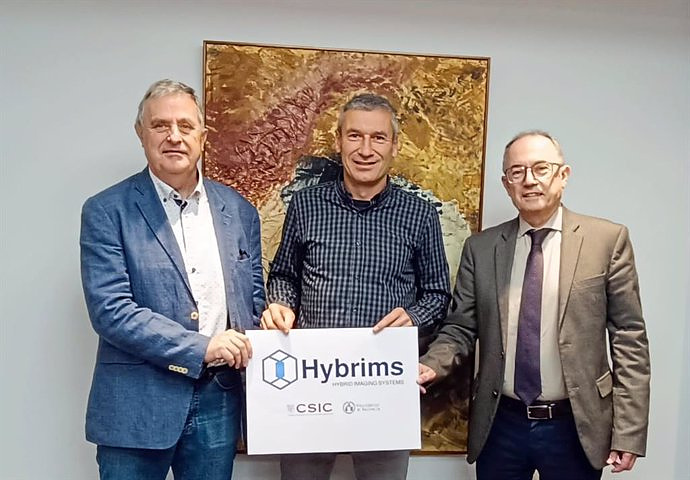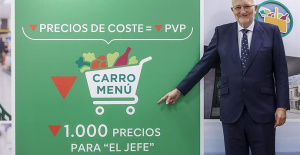The Council will vote this Tuesday for the first time its candidates for the TC with little expectation of success
MADRID, 20 Dic. (EUROPA PRESS) -
The members of the progressive wing of the General Council of the Judiciary (CGPJ) have included their candidate --Supreme Court magistrate José Manuel Bandrés-- on the agenda of the extraordinary plenary session to be held this Tuesday at 5:00 p.m. to elect to the two magistrates who correspond to designate the governing body of judges for the Constitutional Court, according to sources from the CGPJ to Europa Press.
Until now, only the Supreme Court (TS) magistrates César Tolosa and Pablo Lucas, both proposed by the conservative bloc, were listed as candidates on the agenda. The name of Bandrés -which the progressive sector had revealed on November 3-- has been added this Tuesday, since there is a deadline until 5:00 p.m. for the members to present more applicants.
According to the aforementioned sources, despite the fact that there are already three names on the table, the two candidates for the TC are not expected to emerge from this afternoon's meeting, which would mean postponing the negotiations and the eventual appointment to 2023, because --of fail this Tuesday-- it is not expected to take up the matter again in the ordinary plenary session set for Thursday.
This afternoon's debate will take place just 24 hours after the Constitutional Court has suspended the parliamentary process, already in the Senate, of the two amendments that modify the system of election and arrival of candidates to the TC to achieve its renewal.
This urgent meeting was convened last week at the request of nine of the ten conservative members of the CGPJ, after correcting the formal error pointed out to them by the interim president of the Council, Rafael Mozo, who initially refused to convene the extraordinary plenary session because these nine members did not propose any candidate.
The sources consulted by Europa Press explain that, with this movement, the conservative members intended to force their progressive colleagues to withdraw Bandrés's candidacy so that they would support Lucas, who was on the first list of nine applicants released by the progressive members. last October.
And this because the reform proposed by PSOE and Unidas Podemos (UP), in two amendments to the bill that repeals sedition, would change the 'modus operandi', going from a majority of three fifths (11 of the 18 votes at stake ) to a simple one, which would favor the election of the two candidates with the most votes for each block, in the case of the progressive sector: Bandrés.
Faced with the haste of the conservative members, their progressive peers - who until the proposed reform urged proceeding with the two appointments to the TC - now advocated waiting not only for the ordinary plenary session on December 22 in the CGPJ, but even for that the Cortes Generales approved the change of system to vote now with the new rules.
However, the decision adopted on Monday night by the TC, after more than nine hours of intense debate between its eleven magistrates, could lead to another exchange of roles between the two currents of the CGPJ, according to the aforementioned sources.
The conservative majority of the Constitutional Court, made up of six magistrates, agreed to stop the parliamentary processing of both amendments, thus estimating the very precautionary measures requested by the PP in its appeal against the aforementioned reform.
This is an unprecedented decision of the TC -in its more than 40 years of history it had never urgently suspended a parliamentary debate in the Cortes Generales-, which could now lead the conservative block of the CGPJ to slow down and the progressive wing to speed up.
The underlying problem is that the Constitutional Court has been waiting since June 12 for the renewal of the four magistrates who make up the third that the Constitution mandates to replace the Government and CGPJ: Pedro González-Trevijano and Antonio Narváez, appointed in their day by the Executive of Mariano Rajoy; and Juan Antonio Xiol and Santiago Martínez-Vares, appointed at the time by the governing body of the judges.
The legal doubts about the possibility that the two Moncloa candidates could take office without waiting for the two from the CGPJ led to the promotion and approval last July in Parliament of an express reform of the Organic Law of the Judiciary (LOPJ) to return to the Council his power to appoint his two applicants to the court of guarantees.
However, the negotiations within the CGPJ ran aground on December 2 due to the tacit veto of the conservative block to Bandrés, and the refusal of the progressive members to once again fatten their list of applicants (which came to have nine), which led the government parties to launch their reform proposal.

 Exploring Cardano: Inner Workings and Advantages of this Cryptocurrency
Exploring Cardano: Inner Workings and Advantages of this Cryptocurrency Seville.- Economy.- Innova.- STSA inaugurates its new painting and sealing hangar in San Pablo, for 18 million
Seville.- Economy.- Innova.- STSA inaugurates its new painting and sealing hangar in San Pablo, for 18 million Innova.- More than 300 volunteers join the Andalucía Compromiso Digital network in one month to facilitate access to ICT
Innova.- More than 300 volunteers join the Andalucía Compromiso Digital network in one month to facilitate access to ICT Innova.-AMP.- Ayesa acquires 51% of Sadiel, which will create new technological engineering products and expand markets
Innova.-AMP.- Ayesa acquires 51% of Sadiel, which will create new technological engineering products and expand markets Cos bids farewell to Congress warning that the lack of political consensus "affects economic prospects"
Cos bids farewell to Congress warning that the lack of political consensus "affects economic prospects" Two workers died and one injured when two floors collapsed in a building under construction in Fuencarral
Two workers died and one injured when two floors collapsed in a building under construction in Fuencarral The Government will wait until after the European elections to propose measures on democratic regeneration
The Government will wait until after the European elections to propose measures on democratic regeneration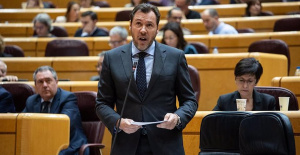 The PP sees Puente as Sánchez's "servant" and the PSOE as a "sect", and the minister accuses them of putting on a show
The PP sees Puente as Sánchez's "servant" and the PSOE as a "sect", and the minister accuses them of putting on a show How Blockchain in being used to shape the future
How Blockchain in being used to shape the future Not just BTC and ETH: Here Are Some More Interesting Coins Worth Focusing on
Not just BTC and ETH: Here Are Some More Interesting Coins Worth Focusing on They develop devices for the precise diagnosis of cancer patients
They develop devices for the precise diagnosis of cancer patients UMH researchers are working on a high-quality apricot crop that requires less irrigation water
UMH researchers are working on a high-quality apricot crop that requires less irrigation water The UPV develops an application to improve the quality of life of patients with glioblastoma
The UPV develops an application to improve the quality of life of patients with glioblastoma A sensor system obtains the fingerprint of essential oils and detects if they have been adulterated
A sensor system obtains the fingerprint of essential oils and detects if they have been adulterated A million people demonstrate in France against Macron's pension reform
A million people demonstrate in France against Macron's pension reform Russia launches several missiles against "critical infrastructure" in the city of Zaporizhia
Russia launches several missiles against "critical infrastructure" in the city of Zaporizhia A "procession" remembers the dead of the Calabria shipwreck as bodies continue to wash up on the shore
A "procession" remembers the dead of the Calabria shipwreck as bodies continue to wash up on the shore Prison sentences handed down for three prominent Hong Kong pro-democracy activists
Prison sentences handed down for three prominent Hong Kong pro-democracy activists ETH continues to leave trading platforms, Ethereum balance on exchanges lowest in 3 years
ETH continues to leave trading platforms, Ethereum balance on exchanges lowest in 3 years Investors invest $450 million in Consensys, Ethereum incubator now valued at $7 billion
Investors invest $450 million in Consensys, Ethereum incubator now valued at $7 billion Alchemy Integrates Ethereum L2 Product Starknet to Enhance Web3 Scalability at a Price 100x Lower Than L1 Fees
Alchemy Integrates Ethereum L2 Product Starknet to Enhance Web3 Scalability at a Price 100x Lower Than L1 Fees Mining Report: Bitcoin's Electricity Consumption Declines by 25% in Q1 2022
Mining Report: Bitcoin's Electricity Consumption Declines by 25% in Q1 2022 Oil-to-Bitcoin Mining Firm Crusoe Energy Systems Raised $505 Million
Oil-to-Bitcoin Mining Firm Crusoe Energy Systems Raised $505 Million Microbt reveals the latest Bitcoin mining rigs -- Machines produce up to 126 TH/s with custom 5nm chip design
Microbt reveals the latest Bitcoin mining rigs -- Machines produce up to 126 TH/s with custom 5nm chip design Bitcoin's Mining Difficulty Hits a Lifetime High, With More Than 90% of BTC Supply Issued
Bitcoin's Mining Difficulty Hits a Lifetime High, With More Than 90% of BTC Supply Issued The Biggest Movers are Near, EOS, and RUNE during Friday's Selloff
The Biggest Movers are Near, EOS, and RUNE during Friday's Selloff Global Markets Spooked by a Hawkish Fed and Covid, Stocks and Crypto Gain After Musk Buys Twitter
Global Markets Spooked by a Hawkish Fed and Covid, Stocks and Crypto Gain After Musk Buys Twitter Bitso to offset carbon emissions from the Trading Platform's ERC20, ETH, and BTC Transactions
Bitso to offset carbon emissions from the Trading Platform's ERC20, ETH, and BTC Transactions Draftkings Announces 2022 College Hoops NFT Selection for March Madness
Draftkings Announces 2022 College Hoops NFT Selection for March Madness

